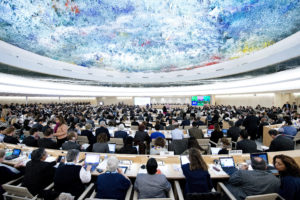
During the review in Geneva on Saturday in front of the United Nations Humans Rights Council, U.S. officials were left stammering over their words and offering up excuses for why its own policies and practices violated the same rights they have tried to force other countries to uphold.
Everything from the systematic torture carried out by the Central Intelligence Agency in the “war on terror” to the overwhelming evidence of racially biased police practices fell under harsh scrutiny as foreign powers urged the U.S. to finally take action to fix such issues.
“We must rededicate ourselves to ensuring that our civil rights laws live up to our promise,” James Cadogan, a senior Justice Department official, said before the Human Rights Council, according to The New York Times.
It’s a promise that has been made by the U.S. before but this time, foreign powers made one thing very clear—words are no longer enough and they will be watching closely for action.
“It was the same old story of the U.S dragging its feet on taking effective action to fully implement its human rights obligations,” said Jamil Dakwar, director of the American Civil Liberties Union’s human rights program, according to The New York Times.
Despite flowery promises of change and reform in the past, that facts proved that America’s vast progress was yet to be seen.
President Barack Obama has deemed the closing of Guantanamo Bay as a “national imperative” but more than 120 people remain locked up in deplorable detention centers for indefinite amounts of time.
“These men have no clear prospect of release or a fair trial under military commissions, which are fundamentally flawed,” Al Jazeera reports. “Among other problems, they allow the use of evidence obtained by coercion, fail to protect attorney-client privilege and use rules that block the defense from obtaining information essential to the case, including about the CIA’s treatment of the detainees on trial while they were in its custody.”
The U.S. Department of Justice did launch an investigation back in 2012, but made it clear that they had no desire to bring about any real charges. The lackluster investigation didn’t meet the “basic standards of credibility and thoroughness,” Al Jazeera explains, and failed to even interview any detainees.
Even after the U.S. released a partially redacted summary of the U.S. Senate Intelligence Committee report, the full 6,700-page report is currently still classified and no officials have taken any meaningful action to call for transparency or appoint a special prosecutor to launch a new investigation.
There was also a global focus on America’s bleak record of killing its Black citizens, specifically through a racially biased justice system. Officials from many countries, including Mexico and Malaysia, all expressed serious concerns over America’s treatment of its marginalized communities.
Cadogan tried to defend the country by insisting that more than 400 law enforcement officials had charges brought against them in the past six years, but, as has already been seen, being charged does not mean the officers will ever face any consequences for their actions. In addition, the 400 officers charged in six years doesn’t come close to equating to the amount of Black citizens that have arguably been unjustifiably killed by police practices.
The global attention on the high-profile killings of Black people like Michael Brown in Ferguson, Eric Garner in Staten Island and Freddie Gray in Baltimore has finally put pressure on U.S. officials to stop “dragging their feet” on creating meaningful change that foreign powers have been waiting to see from one of the world’s greatest economic powerhouses.
“These events challenge us to do better and to work harder for progress through both dialogue and action,” Cadogan added, according to the Huffington Post.
There are a plethora of issues the U.S. will have to address if it wants to get back into the good graces of the foreign powers that are disappointed by America’s false claims of hosting a “post-racial” society with vast opportunity for all.
America’s record with immigration has made it very clear that it doesn’t seem eager to live up to that empty promise of opportunity. As the nation continues detaining countless immigrants, it has even gone as far to place children at risk by detaining them as well.
“The administration admits that the detentions are aimed at deterring other migrants, many of whom are fleeing persecution at home,” Al Jazeera reports. “But international law bars all detention of children for immigration purposes, which is profoundly harmful to their development.”
That international law, however, didn’t stop America from detaining children, along with their families, when they were seized at the border.
In addition to being urged to fix issues with immigration, the justice system, torture and other practices, America has also been asked to come face-to-face with the ethical discrepancies regarding its “Big Brother” role.
Several foreign officials expressed concerns regarding America’s massive-scale surveillance programs that seem to step beyond the boundaries of national security and well into the territory of a serious invasion of privacy.
Even after NSA whistleblower, Edward Snowden, brought the troubling practices to light, America hasn’t moved to reform the practices that caused widespread criticisms of how the government is keeping tabs on its citizens.
“Nearly two years since his first disclosures, neither the White House nor Congress has yet to impose meaningful limits on these programs, which affect potentially millions of people inside and outside the U.S.,” Al Jazeera reports. “Even a very modest bill to impose some constraints on domestic surveillance, the USA Freedom Act, faces strong opposition from legislators who support the programs.”
These are issues that certainly aren’t new to those living within U.S. borders, but it seems surprising that the tables have turned on the country that has been looking down its own star-spangled nose at countries who are also battling with human and civil rights issues.
Perhaps now, as eyes from across the globe fixate on the country that so proudly touts messages of freedom and opportunity, U.S. officials will be pressured to follow through on the promises they have used to puff up speeches for years.


